Rob Mclennan's Blog, page 327
November 10, 2016
Drunken Boat blog "spotlight" series #7: Gil McElroy
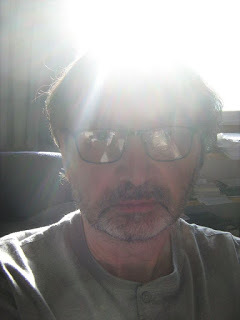 The seventh in my monthly "spotlight" series over at the Drunken Boat blog, each featuring a different poet with a short statement and a new poem or two, is now online:
Colborne, Ontario poet Gil McElroy
. The first six in the series feature
Vancouver poet Renée Sarojini Saklikar
,
Ottawa poet Jason Christie
,
Montreal poet and performer Kaie Kellough
,
Ottawa poet Amanda Earl
,
American poet Elizabeth Robinson
and
American poet Jennifer Kronovet
. A new post is scheduled for the first Monday of every month.
The seventh in my monthly "spotlight" series over at the Drunken Boat blog, each featuring a different poet with a short statement and a new poem or two, is now online:
Colborne, Ontario poet Gil McElroy
. The first six in the series feature
Vancouver poet Renée Sarojini Saklikar
,
Ottawa poet Jason Christie
,
Montreal poet and performer Kaie Kellough
,
Ottawa poet Amanda Earl
,
American poet Elizabeth Robinson
and
American poet Jennifer Kronovet
. A new post is scheduled for the first Monday of every month.
Published on November 10, 2016 05:31
November 9, 2016
new from above/ground press: Barton, Adams, Downs, Polyck-O'Neill, Claxton, McEwan, Turner + Bowering,
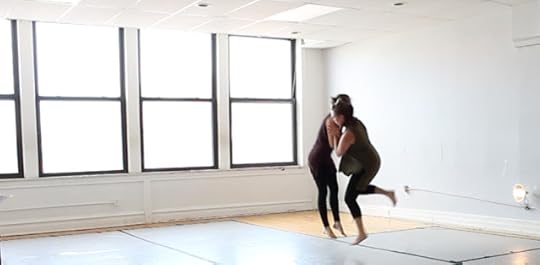 REFRAMING PAUL CADMUS
REFRAMING PAUL CADMUSJohn Barton
$5
See link here for more information
GRAPPLE
Carrie Olivia Adams
$4
See link here for more information
Shiftless(Harvester)
Buck Downs
$4
See link here for more information
Femme
Julia Polyck-O’Neill
$4
See link here for more information
THE PATIENT STORM
Dana Claxton
$4
See link here for more information
theory of rooms
Andrew McEwan
$4
See link here for more information
Fugue
Michael Turner
$3
See link here for more information
That Toddlin’ Town / Baby, don’ ya wanna go?
George Bowering
$3
See link here for more information
keep an eye on the above/ground press blog for author interviews, new writing, reviews, upcoming readings and tons of other material;
published in Ottawa by above/ground press
September-October 2016
a/g subscribers receive a complimentary copy of each
2017 above/ground press subscriptions, now available! WE ARE NOW THREE TITLES AWAY FROM AN ACCUMULATED EIGHT HUNDRED TITLES!
To order, send cheques (add $1 for postage; outside Canada, add $2) to: rob mclennan, 2423 Alta Vista Drive, Ottawa ON K1H 7M9 or paypal (above). Scroll down here to see various backlist titles (many, many things are still in print). and, in case you missed it, here is a list of the summer 2016 titles , and the spring 2016 titles .
Review copies of any title (while supplies last) also available, upon request.
forthcoming chapbooks by Geoffrey Young, Carrie Hunter, philip miletic, Sandra Moussempès (trans. Eléna Rivera), Jessica Smith and Sarah Fox, as well as a new “poem” broadsheet on the blog soon by Derek Beaulieu!
Published on November 09, 2016 05:31
November 8, 2016
Brynne Rebele-Henry, Fleshgraphs
38.
Her body washes in, a tangle of seaweed and her grandmother’s fake sapphires. He is disappointed about the way her body is shaped. “I thought she was a whale.” We watch her arching her back, her eyes sand-coated magnifying glasses. Ambulances never occur to us, we say later, when the light is a funeral home disco in our un-made-up faces. We just wanted to see some mating whales, we say.
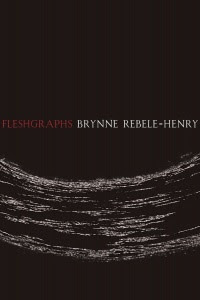 American poet Brynne Rebele-Henry’s remarkable first full-length poetry book is
Fleshgraphs
(Callicoon NY: Nightboat Books, 2016), a “visceral engagement with the politics and poetics of girlhood by a 14-year-old author.” Composed in two hundred and sixty-six short, seemingly self-contained numbered sections over a few weeks when the author was still only fourteen years old, Rebele-Henry’s Fleshgraphs exist in collusion, collision and collage, pushing a conversation of girlhood, sex, the body, intimacy and violence through an occasionally dark and even grotesque humour. “I ask my wife if I can take a shit inside her.” she writes in section #106. Further along, section #121 reads: “Her thighs taste like Lysol.”
American poet Brynne Rebele-Henry’s remarkable first full-length poetry book is
Fleshgraphs
(Callicoon NY: Nightboat Books, 2016), a “visceral engagement with the politics and poetics of girlhood by a 14-year-old author.” Composed in two hundred and sixty-six short, seemingly self-contained numbered sections over a few weeks when the author was still only fourteen years old, Rebele-Henry’s Fleshgraphs exist in collusion, collision and collage, pushing a conversation of girlhood, sex, the body, intimacy and violence through an occasionally dark and even grotesque humour. “I ask my wife if I can take a shit inside her.” she writes in section #106. Further along, section #121 reads: “Her thighs taste like Lysol.” From section to section, the perspective, and even the narrator, shifts, presenting a sequence of near-aphorisms that thrash and rail against the reader and each other. As she describes the collection in a recent interview: “[…] the book is a literal graph of flesh. The book is composed of confessions (inspired by both religious confessionals and online confessions), and is about benign or intense or horrible things happening to bodies, and each experience is told through a different numbered fragment. The book is also composed of fragmented short paragraphs, or graphs. […] I was trying to write a feminist dissection of rape culture and online confessions, but also a celebration of the body’s resilience.”
104.
I sidle up to the cashier and undo the tie of my trench coat and my breasts come out and I rub them against the conveyor belt and lick my true love’s face.
Part of what makes Brynne Rebele-Henry’s Fleshgraphsso compelling is in its daring, honesty and straightforwardness, speaking pointedly to “a range of sexualities,” perspectives and even personalities. Her prose is fearless, rich and evocative, thick with detail and presence and confidence, making this one of the most frighteningly-talented debuts I’ve seen in a very long time.
1.
I alphabetize the girls by tens and letters. First: Annie and her cellulite thighs that made her say of herself: walrus. I would bite them with my too sharp incisors. Second: Betty and the weird sounds she made that were more like birth than sex and her pinup rolled back hair. Third: Carrie, and her light moustache. Fourth: Diana and her autumn mouth and how she always burned cookies. I stop at six because that’s too fucking sad but I think of her knuckles and the sound they made against my forehead still.
Published on November 08, 2016 05:31
November 7, 2016
On Writing : an occasional series
 We're more than three years and over one hundred essays into the occasional series of "On Writing" essays I've been curating over at the ottawa poetry newsletter blog. I've included an updated list, below, of those pieces posted so far, and the list is becoming quite substantive. Way (way) back in April, 2012, I discovered (thanks to Sarah Mangold) the website for the NPM Daily, and absolutely loved the short essays presented on a variety of subjects surrounding the nebulous idea of “on writing,” prompting me to kick-start a similar series of responses to the question of writing.
We're more than three years and over one hundred essays into the occasional series of "On Writing" essays I've been curating over at the ottawa poetry newsletter blog. I've included an updated list, below, of those pieces posted so far, and the list is becoming quite substantive. Way (way) back in April, 2012, I discovered (thanks to Sarah Mangold) the website for the NPM Daily, and absolutely loved the short essays presented on a variety of subjects surrounding the nebulous idea of “on writing,” prompting me to kick-start a similar series of responses to the question of writing.Forthcoming: new essays by Susan M. Schultz, Craig Santos Perez, kevin mcpherson eckhoff, Laressa Dickey, Rusty Morrison and Elee Kraljii Gardiner.
On Writing #112 : Jenna Butler : To the woodlot ; On Writing #111 : Sandra Nicholls : Thoughts on writing ; On Writing #110 : Waubgeshig Rice : On Writing ; On Writing #109 : Elaine Woo : The Crux ; On Writing #108 : David B. Goldstein : On Writing ; On Writing #107 : Gina Myers : Is there room in the room that you room in? ; On Writing #106 : Valerie Witte : By the Grace of Gilmour ; On Writing #105 : Molly Gaudry : On Writing ; On Writing #104 : Geoffrey Young : WHAT'S BEHIND THE WORDS? ; On Writing #103 : Bruce Whiteman : On Writing ; On Writing #102 : Karl Jirgens : Writing Lives: Writing Lives ; On Writing #101 : Daniel Zomparelli : On Writing ; On Writing #100 : Dale Smith : Scouts of the Interior ; On Writing #99 : Brian Henderson : On Writing ; On Writing #98 : Vanessa Lent : Making room ; On Writing #97 : Paul Pearson : WRITING IS FAILING: My 10 Rules for Writing ; On Writing #96 : Mer Brebner : You always swore you wouldn't... ; On Writing #95 : Claudia Coutu Radmore : The Poetry Three ; On Writing #94 : Valerie Coulton : On Writing ; On Writing #93 : lars palm : first things first ; On Writing #92 : Ashley-Elizabeth Best : The Hard Remainder ; On Writing #91 : A.J. Levin : The Curse of Writing Poetry ; On Writing #90 : Julie Morrissy : On Writing ; On Writing #89 : Alice Zorn : Fixings ; On Writing #88 : Lillian Necakov : Writing is a Hyena ; On Writing #87 : Ken Norris : ON WRITING ; On Writing #86 : Jani Krulc : Practice, practice: On writing and yoga ; On Writing #85 : Steven Artelle : On Writing ; On Writing #84 : Chris Eaton : On Writing ; On Writing #83 : Kaie Kellough : Ceremony ; On Writing #82 : Jacqueline Valencia : On Writing ; On Writing #81 : Kevin Killian : Writing the Anthropocene ; On Writing #80 : Mike Spry : On Writing ; On Writing #79 : Dina Del Bucchia : OMG. Watch TV! ; On Writing #78 : Michelle Berry : On Writing ; On Writing #77 : Eric Schmaltz : Writing as an Intimacy with Machines ; On Writing #76 : Barbara Tomash : Dear PRE- ; On Writing #75 : Eileen R. Tabios : NO LONGER CASUAL ; On Writing #74 : Sheryda Warrener : Make It New ; On Writing #73 : Pam Brown : Writing ; On Writing #72 : Renee Rodin : The Nub ; On Writing #71 : Rebecca Rosenblum : Ways to Help a Fellow Writer with His/Her Work ; On Writing #70 : Susannah M. Smith : On Writing ; On Writing #69 : Natalie Simpson : On Writing ; On Writing #68 : Jennifer Kronovet : Fighting and Writing ; On Writing #67 : George Stanley : Writing Old Age ; On Writing #66 : George Fetherling : On Writing ; On Writing #65 : Gail Scott : THE ATTACK OF DIFFICULT PROSE ; On Writing #64 : Laisha Rosnau : The Long Game ; On Writing #63 : Arjun Basu : Write ; On Writing #62 : Angie Abdou : The Writer & The Bottle ; On Writing #61 : Carolyn Marie Souaid : Lawyers, Liars & Writers ; On Writing #60 : Priscila Uppal : On Creative Health ; On Writing #59 : Sky Gilbert : Yes, They Live ; On Writing #58 : Peter Richardson : Cellar Posting ; On Writing #57 : Catherine Owen : "Bright realms of promise": ON THE POETIC ; On Writing #56 : Sarah Burgoyne : a series of permissions-givings ; On Writing #55 : Anne Fleming : Funny ; On Writing #54 : Julie Joosten : On Haptic Pleasures: an Avalanche, the Internet, and Handwriting ; On Writing #53 : David Dowker : Micropoetics, or the Decoherence of Connectionism ; On Writing #52 : Renée Sarojini Saklikar : No language exists on the outside. Finders must venture inside. ; On Writing #51 : Ian Roy : On Writing, Slowly ; On Writing #50 : Rob Budde : On Writing ; On Writing #49 : Monica Kidd : On writing and saving lives ; On Writing #48 : Robert Swereda : Why Bother? ; On Writing #47 : Missy Marston : Children vs Writing: CAGE MATCH! ; On Writing #46 : Carla Barkman : Tastes Like Chicken ; On Writing #45 : Asher Ghaffar : The Pen: ; On Writing #44 : Emily Ursuliak : Writing on Transit ; On Writing #43 : Adam Sol : How I Became a Writer ; On Writing #42 : Jason Christie : To Paraphrase ; On Writing #41 : Gary Barwin : ON WRITING ; On Writing #40 : j/j hastain : Infinite Chakras: a Trans-Temporal Mini-Memoir ; On Writing #39 : Peter Norman : Red Pen of Fury! ; On Writing #38 : Rupert Loydell : Intricately Entangled ; On Writing #37 : M.A.C. Farrant : Eternity Delayed ; On Writing #36 : Gil McElroy : Building a Background ; On Writing #35 : Charmaine Cadeau : Stupid funny. ; On Writing #34 : Beth Follett : Born of That Nothing ; On Writing #33 : Marthe Reed : Drawing Louisiana ; On Writing #32 : Chris Turnbull : Half flings, stridence and visual timber ; On Writing #31 : Kate Schapira : On Writing (Sentences) ; On Writing #30 : Michael Bryson : On Writing ; On Writing #29 : Sara Heinonen : On Writing ; On Writing #28 : Stan Rogal : Writers' Anonymous ; On Writing #27 : Lola Lemire Tostevin : What's in a name? ; On Writing #26 : Kevin Spenst : On Writing ; On Writing #25 : Kate Cayley : An Effort of Attention ; On Writing #24 : Gregory Betts : On Writing ; On Writing #23 : Hailey Higdon : Hiding Places ; On Writing #22 : Matthew Firth : How I write ; On Writing #21 : Nichole McGill : Daring to write again ; On Writing #20 : Rob Thomas : Hey, Short Stuff!: On Writing Kids ; On Writing #19 : Anik See : On Writing ; On Writing #18 : Eric Folsom : On Writing ; On Writing #17 : Edward Smallfield : poetics as space ; On Writing #16 : Sonia Saikaley : Writing Before Dawn to Answer a Curious Calling ; On Writing #15 : Roland Prevost : Ink / Here ; On Writing #14 : Aaron Tucker : On Writing ; On Writing #13 : Sean Johnston : On Writing ; On Writing #12 : Ken Sparling : From some notes for a writing workshop ; On Writing #11 : Abby Paige : On the Invention of Language ; On Writing #10 : Adam Thomlison : On writing less ; On Writing #9 : Christian McPherson : On Writing ; On Writing #8 : Colin Morton : On Writing ; On Writing #7 : Pearl Pirie : Use of Writing ; On Writing #6 : Faizel Deen : Summer, Ottawa. 2013. ; On Writing #5 : Michael Dennis : Who knew? ; On Writing #4 : Michael Blouin : On Process ; On Writing #3 : rob mclennan : On writing (and not writing) ; On Writing #2 : Amanda Earl : Community ; On Writing #1 : Anita Dolman : A little less inspiration, please (Or, What ever happened to patrons, anyway?)
Published on November 07, 2016 05:31
November 6, 2016
On beauty
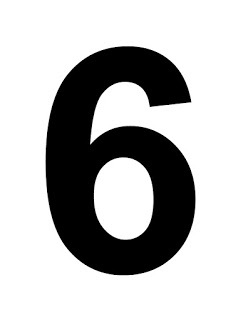 There is no such thing as safe. She skims posts from a variety of her Facebook groups, mothers posting notices on another dead child, another dead baby. One posts of their son who died a week prior, only twenty-eight days old. A preemie, an infection entered his lungs, and he hadn’t the strength to recover. Another memorializes the first anniversary of her daughter’s accident, after toddler hands pulled a boiling pan from the stove, causing third-degree burns to thirty percent of her body. The scalding water had swollen closed her eyes. When I walk into the family room, she is sitting with laptop, weeping. You need to stop reading those, I repeat.
There is no such thing as safe. She skims posts from a variety of her Facebook groups, mothers posting notices on another dead child, another dead baby. One posts of their son who died a week prior, only twenty-eight days old. A preemie, an infection entered his lungs, and he hadn’t the strength to recover. Another memorializes the first anniversary of her daughter’s accident, after toddler hands pulled a boiling pan from the stove, causing third-degree burns to thirty percent of her body. The scalding water had swollen closed her eyes. When I walk into the family room, she is sitting with laptop, weeping. You need to stop reading those, I repeat.The women appeared in the kitchen. They pushed me away from the counter. The lot of them. My mother-in-law and her sisters. Came rushing. They pushed me out into the living room. No, they said, no. They would take over from here. I had everything under control. I was annoyed, but not enough to challenge them. They had taken over. My newborn son and wife were asleep. I moved downstairs and sat at my desk. I ignored their clatter. I opened up my laptop and into my most recent file. I poked at a few lines of prose. I prodded. The novel shuddered, some. Its surface tension shifted, akin to what Neo could see at the end of The Matrix. I could see stars.
Published on November 06, 2016 05:31
November 5, 2016
Queen Mob's Teahouse : Ben Fama interviews Abraham Adams
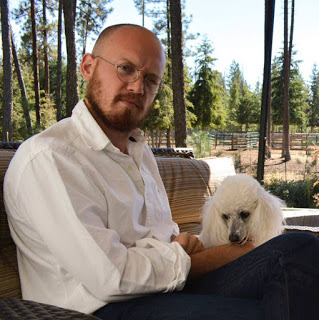 As my tenure as interviews editor at Queen Mob's Teahouse continues, the seventeenth interview is now online: An interview with Abraham Adams by Ben Fama. Other interviews from my tenure include: an interview with poet, curator and art critic Gil McElroy, conducted by Ottawa poet Roland Prevost, an interview with Toronto poet Jacqueline Valencia, conducted by Lyndsay Kirkham, an interview with Drew Shannon and Nathan Page, also conducted by Lyndsay Kirkham, an interview with Ann Tweedy conducted by Mary Kasimor, an interview with Katherine Osborne, conducted by Niina Pollari, an interview with Catch Business, conducted by Jon-Michael Frank, a conversation between Vanesa Pacheco and T.A. Noonan, "On Translation and Erasure," existing as an extension of Jessica Smith's The Women in Visual Poetry: The Bechdel Test, produced via Essay Press, Five questions for Sara Uribe and John Pluecker about Antígona González by David Buuck (translated by John Pluecker),"overflow: poetry, performance, technology, ancestry": kaie kellough in correspondence with Eric Schmaltz, and Mary Kasimor's interview with George Farrah, Brad Casey interviewed byEmilie Lafleur, and David Buuck interviews John Chávez about Angels of the Americlypse: An Anthology of New Latin@ Writing.
As my tenure as interviews editor at Queen Mob's Teahouse continues, the seventeenth interview is now online: An interview with Abraham Adams by Ben Fama. Other interviews from my tenure include: an interview with poet, curator and art critic Gil McElroy, conducted by Ottawa poet Roland Prevost, an interview with Toronto poet Jacqueline Valencia, conducted by Lyndsay Kirkham, an interview with Drew Shannon and Nathan Page, also conducted by Lyndsay Kirkham, an interview with Ann Tweedy conducted by Mary Kasimor, an interview with Katherine Osborne, conducted by Niina Pollari, an interview with Catch Business, conducted by Jon-Michael Frank, a conversation between Vanesa Pacheco and T.A. Noonan, "On Translation and Erasure," existing as an extension of Jessica Smith's The Women in Visual Poetry: The Bechdel Test, produced via Essay Press, Five questions for Sara Uribe and John Pluecker about Antígona González by David Buuck (translated by John Pluecker),"overflow: poetry, performance, technology, ancestry": kaie kellough in correspondence with Eric Schmaltz, and Mary Kasimor's interview with George Farrah, Brad Casey interviewed byEmilie Lafleur, and David Buuck interviews John Chávez about Angels of the Americlypse: An Anthology of New Latin@ Writing.Further interviews I've conducted myself over at Queen Mob's Teahouse include: Claire Freeman-Fawcett on Spread Letter , Stephanie Bolster on Three Bloody Words, Claire Farley on Canthius, Dale Smith on Slow Poetry in America, Allison Green, Meredith Quartermain, Andy Weaver, N.W Lea and Rachel Loden.
If you are interested in sending a pitch for an interview my way, check out my "about submissions" write-up at Queen Mob's; you can contact me via rob_mclennan (at) hotmail.com
Published on November 05, 2016 05:31
November 4, 2016
Michael e. Casteels, The Last White House at the End of the Row of White Houses
THE WOODSMAN
On the bank of the stream, I meet a hunter. His gun is moss-covered, his beard thick with foliage. He says he has been lost for years. I tell him he is not far from the village and I can show him the way back. He smiles a toothless grin and says he’s been away too long to go back. He now understands the nature of change, leaves turning from green to red as he blinks. I grab his arm to lead him, but the limb snaps off in my hand. The hunter looks at me with knotted eyes and shakes his head. The air grows cold. The wood needs splitting. I lift my axe and swing. He smiles a toothless grin and tells me he has been lost for years.
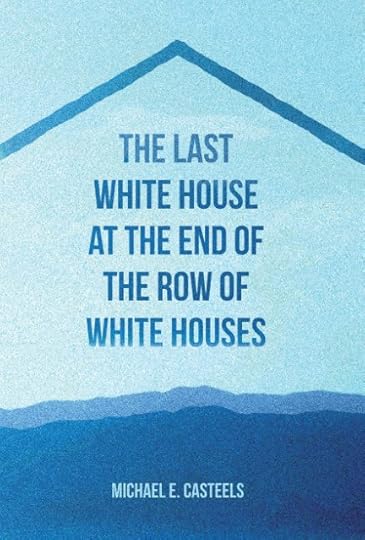 It is lovely to see Kingston poet and publisher Michael e. Casteels’s first full-length collection see print, his
The Last White House at the End of the Row of White Houses
(Halifax NS/Picton ON: Invisible Publishing, 2016). The author of over a dozen chapbooks, including full moon loon call(Puddles of Sky Press, 2013), The Robot Dreams (Puddles of Sky Press, 2013), heck engine. rhinoceros. tungsten. (Puddles of Sky Press, 2015) and
solar-powered light bulb and the lake’s achy tooth
(Apt 9, 2015), Casteels’
The Last White House at the End of the Row of White Houses
is a collection of his more narrative work (some of which has appeared in chapbook form), focusing predominantly on his prose poems. The focus of this current collection suggests, possibly, that a further poetry title, focusing entirely on his incredibly-short poems (which have been compared to works by Nelson Ball, Cameron Anstee and Mark Truscott) might also be in the works (but that is, admittedly, conjecture).
It is lovely to see Kingston poet and publisher Michael e. Casteels’s first full-length collection see print, his
The Last White House at the End of the Row of White Houses
(Halifax NS/Picton ON: Invisible Publishing, 2016). The author of over a dozen chapbooks, including full moon loon call(Puddles of Sky Press, 2013), The Robot Dreams (Puddles of Sky Press, 2013), heck engine. rhinoceros. tungsten. (Puddles of Sky Press, 2015) and
solar-powered light bulb and the lake’s achy tooth
(Apt 9, 2015), Casteels’
The Last White House at the End of the Row of White Houses
is a collection of his more narrative work (some of which has appeared in chapbook form), focusing predominantly on his prose poems. The focus of this current collection suggests, possibly, that a further poetry title, focusing entirely on his incredibly-short poems (which have been compared to works by Nelson Ball, Cameron Anstee and Mark Truscott) might also be in the works (but that is, admittedly, conjecture). There is a surreal strangeness to the narratives of Casteels’ prose poems, one that works to keep the reader slightly off-kilter, forcing a deeper attention to the ebbs and the flows of his sentences. “The primates spot-checked their harpsichords, spoon-fed the plesiosaur, and garrisoned the tax collectors.” he writes, to open the poem “A BRIEF HISTORY OF THE ICE AGE.” There is something wonderfully charming about these poems, in which Casteels presents something quite familiar, but slightly askew, turning expectation inside out, whether writing about turnips “grown in the / fine pastures of Heaven and harvested by divine angels / of light,” or of oracles, hermit crabs and turkeys. There is very much a thread of the metaphysical that runs through these poems, one that seeks a comprehension deeper than what can be seen on the surface, and one that remains elusive, nearly ghost-like, composed as a perfect blend between the tangible and the intangible. These are beautiful, strange and uplifting poems, set on the border between what is known, and what might be impossible.
THE ROCKING HORSE AND THE FLOOD
The wooden horse swayed in the breeze. The rain continued. The smell of wet cement was replaced with the fragrance of ocean. There was no plug to be pulled and the tide rose quickly. The sidewalk sprouted seaweed, cars gargled and sputtered. The wooden horse reared on, galloping over the waves, its mane glistening, teeth painted into a smile. Our neighbor was building a raft out of garbage cans, but it was too late; the horse had rocked out of sight, its wooden hooves splashing like a child in a puddle.
Published on November 04, 2016 05:31
November 3, 2016
12 or 20 (second series) questions with Lochlan Bloom
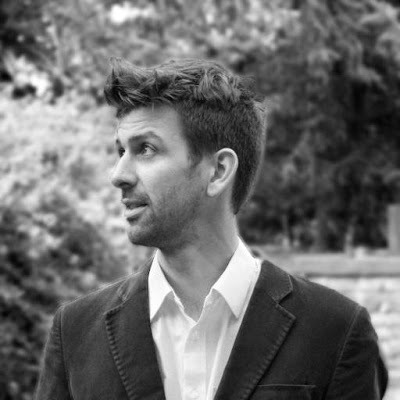 Lochlan Bloom
is a British novelist, screenwriter and short story writer. The BBC Writersroom describes his writing as ‘unsettling and compelling… vivid, taut and grimly effective work’.
Lochlan Bloom
is a British novelist, screenwriter and short story writer. The BBC Writersroom describes his writing as ‘unsettling and compelling… vivid, taut and grimly effective work’.He is the author of the meta-fictional novel The Wave as well as the short fiction pieces - Trade and The Open Cage. He has also written for BBC Radio, Slant Magazine, Litro Magazine, IronBox Films, The Metropolist, and Calliope, the official publication of the Writers’ Special Interest Group (SIG) of American Mensa, amongst others.
1 - How did your first book change your life? How does your most recent work compare to your previous? How does it feel different?
The writing process and the publication process were both quite distinct. Writing a novel definitely changed my approach to editing and certainly helped me develop my writing style but there was no great epiphany the moment I finished the last page.
Finding a publisher and seeing the book to print was a very different experience and quite a learning curve. It changed things to the extent that it made me ‘a published author’.
2 - How did you come to fiction first, as opposed to, say, poetry or non-fiction?
I have written non-fiction and worked as a journalist before but I always wrote fiction alongside so it never seemed an either/or choice.
3 - How long does it take to start any particular writing project? Does your writing initially come quickly, or is it a slow process? Do first drafts appear looking close to their final shape, or does your work come out of copious notes?
I tend to jot down ideas all the time and these can be anything from a relatively well-formed plot concept to a half-finished sentence with no context whatsoever. There’s not exact length of time it takes to start a project but at some point these ideas start to coalesce around a particular theme and I find the notes I am writing are getting longer and longer.
4 - Where does a work of fiction usually begin for you? Are you an author of short pieces that end up combining into a larger project, or are you working on a "book" from the very beginning?
I generally have a good idea of the rough form of a piece before I start writing it in earnest - whether it will be a short story, novel, script etc – but sometimes that can change as I start working on something.
5 - Are public readings part of or counter to your creative process? Are you the sort of writer who enjoys doing readings?
Its something very separate from the writing process for me. I don’t mind doing public readings and occasionally enjoy them but it feels quite separate from writing or reading which are much more private activities for me.
Having said that I think reading text aloud or to a small writing group is an excellent means of stress-testing a piece and finding the areas that need improvement.
6 - Do you have any theoretical concerns behind your writing? What kinds of questions are you trying to answer with your work? What do you even think the current questions are?
Having trained as a physicist, I am interested in how we as readers take information from the world around us and construct an understanding of reality.
The way we combine and interpret not just stories but mathematical theories, philosophies, face-to-face interactions or beliefs in the supernatural to justify our actions in the world is a fascinating subject and one I try to explore in my writing.
7 – What do you see the current role of the writer being in larger culture? Does s/he even have one? What do you think the role of the writer should be?
I think that’s a very interesting question as it has without doubt changed dramatically in the last thirty or so years. The internet has made everyone a writer and commentator (even if its only writing a facebook post) and this in turn has diluted the role of the ‘writer’ as a cultural diviner.
I don’t think its possible to say what the role of the writer ‘should be’ but for me it is about exploring the edges of the lived experience in ways that are inaccessible through other mediums or approaches.
The thing that separates writing from other forms of expression such as music, dance, film etc for me is the essential inscrutability of the written word. We learn this bizarre process whereby we encode and decode hieroglyphs on a page and from this somehow this hallucinatory mental space opens up.
As a writer I think the challenge is to try to capture that luminous quality that great literature allows us to experience.
8 - Do you find the process of working with an outside editor difficult or essential (or both)?
For the most part Ive had great experiences working with editors and I think the process can really add to the finished work but it very much depends on the editor.
9 - What is the best piece of advice you've heard (not necessarily given to you directly)?
You can always give up
10 - How easy has it been for you to move between genres (short stories to screenplays to the novel)? What do you see as the appeal?
Very easy. I think I would struggle if someone said I had to be confined to one genre as the boundaries can be so arbitrary.
11 - What kind of writing routine do you tend to keep, or do you even have one? How does a typical day (for you) begin?
I think this is something that writers can fixate on too much. Certainly when I was starting out I put a lot of emphasis on trying to understand what kind of routine other writers kept and to follow something similar. In reality Im not sure it is too productive to know other writers routine any more than to know what they ate for lunch.
12 - When your writing gets stalled, where do you turn or return for (for lack of a better word) inspiration?
I normally go for a walk.
13 - What fragrance reminds you of home?
Cant think of one in particular.
14 - David W. McFadden once said that books come from books, but are there any other forms that influence your work, whether nature, music, science or visual art?
I think books come from books in the sense that the raw materials of literature are shaped by what has come before. The way we use language, the way we structure stories, the way we understand a sentence all depend on the books we have read. But what we write about is absolutely influenced by all these forms and more. I think there are a lot of parallels between natural language and mathematics in the way we use these to describe the world around us. Both have an abstract, theoretical quality that academics can discuss between themselves but the real reason they are so wide spread is because they give us insight at a deep level at how we understand the world around us.
15 - What other writers or writings are important for your work, or simply your life outside of your work?
Too many to list.
16 - What would you like to do that you haven't yet done?
Write a bucket list.
17 - If you could pick any other occupation to attempt, what would it be? Or, alternately, what do you think you would have ended up doing had you not been a writer?
Ninja
18 - What made you write, as opposed to doing something else?
I’ve always written things down and I guess the number of words has just grown and grown.
19 - What was the last great book you read? What was the last great film?
I enjoyed Satin Island by Tom McCarthy recently and The Third Reich by Roberto Bolaño
20 - What are you currently working on?
Its under wraps
12 or 20 (second series) questions;
Published on November 03, 2016 05:31
November 2, 2016
by request : Rose and Aoife's Hallowe'en (multiple) outfits,

 Since more than a couple folk have requested, here are photos of our young ladies in most of their multiple Hallowe'en outfits. Yes, multiple. From Monday morning to Tuesday, Rose, for example, was dressed as a Fox (for Monday preschool), a monkey (after school) and a unicorn (which she referred to as a "dragon unicorn"), a butterfly (for trick-or-treating), a flower (first thing Tuesday morning) and a ballerina (for Tuesday preschool).
Since more than a couple folk have requested, here are photos of our young ladies in most of their multiple Hallowe'en outfits. Yes, multiple. From Monday morning to Tuesday, Rose, for example, was dressed as a Fox (for Monday preschool), a monkey (after school) and a unicorn (which she referred to as a "dragon unicorn"), a butterfly (for trick-or-treating), a flower (first thing Tuesday morning) and a ballerina (for Tuesday preschool). Aoife, it would seem, has nearly the same amount of outfits (the Dalek outfit was knitted for Rose 2 years ago by Christine's cousin Carla). As well, they both woke me over the weekend dressed as butterflies.
Aoife, it would seem, has nearly the same amount of outfits (the Dalek outfit was knitted for Rose 2 years ago by Christine's cousin Carla). As well, they both woke me over the weekend dressed as butterflies.

 Not every costume managed a photo, so there are still photos to someday catch of Rose as a monkey, and Aoife as a unicorn and butterfly (yes, they both have their own monkey, unicorn and butterfly outfits). I suspect over the next few years, their dress-up trunk will overflow!
Not every costume managed a photo, so there are still photos to someday catch of Rose as a monkey, and Aoife as a unicorn and butterfly (yes, they both have their own monkey, unicorn and butterfly outfits). I suspect over the next few years, their dress-up trunk will overflow! Aoife and I remained home on Monday night to catch trick-or-treaters (we had sixteen, which is actually double what we had last year) as Christine took Rose to her swimming lesson (she insisted upon going) before trick-or-treating around our neighbourhood.
Aoife and I remained home on Monday night to catch trick-or-treaters (we had sixteen, which is actually double what we had last year) as Christine took Rose to her swimming lesson (she insisted upon going) before trick-or-treating around our neighbourhood.

Published on November 02, 2016 05:31
November 1, 2016
Lisa Robertson, 3 Summers
You could say that form is learning
you can see form take shape
at the coronal suture’s first arcade
it’s explaining it’s appearing
unestranged from enormity’s
prick of a spiny plant like a rose
experimenting it’s bursting and
usually it’s repeating why is form
a dog as a horse as a deer as a
fish and a bramble a grater rapacious
the second cervical vertebra is
repeating is a question we can
ask with our bodies and what is
a toothy coccyx is the beak of an ancient
dove below the sacrum the tip of
the sacrum places in the person a
sensation of slow form repeating it
doesn’t require its own skin to repeat (“On Form”)
As the press release for Canadian poet Lisa Robertson’s 3 Summers (Toronto ON: Coach House Books, 2016) informs: “What began as a conceptual project for Robertson – working from and through Lucretius’s De Rerum Natur – evolved into this series of reports on the state of the poet’s living body and its thoughts, told from the heart of three summers spent in rural France.” This is not the first time Robertson has explored the Roman poet and philosopher Lucretius’s only known work, as Emily Critchley, in a review for the Poetry Project Newsletter, wrote that Robertson’s Magenta Soul Whip (Coach House Books, 2009) was:
a profound poetic meditation on the nature of things – after Lucretius’ epic philosophical poem on Epicurean physics, De rerum natura. It is about creation; it is about humanity; our propensity for naming (language); faith, or ‘the long science of submission’ as the poetry puts it; fear; love (familial, sexual, metaphysical) and the ‘liquid rope’ that attaches all of these: that of knowledge. Says the opening line of the collection: ‘Sit us on Lucite gently and we will tell you how knowledge came to us.’
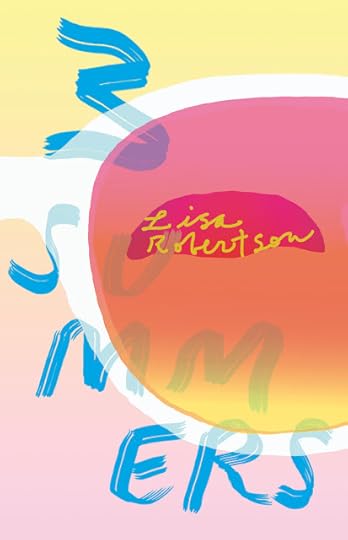 3 Summers is composed in eleven poem-sections, utilizing variations on the collage/fragment, including numerous pieces as short sketches – “The Seam,” “Toxins,” “On Form,” “On Physical Real Beginning and What Happens Next,” “The Middle,” “A Coat,” “Rivers,” “Party,” “Third Summer,” “An Awning” and “Rose” – and opens with this short untitled poem-fragment:
3 Summers is composed in eleven poem-sections, utilizing variations on the collage/fragment, including numerous pieces as short sketches – “The Seam,” “Toxins,” “On Form,” “On Physical Real Beginning and What Happens Next,” “The Middle,” “A Coat,” “Rivers,” “Party,” “Third Summer,” “An Awning” and “Rose” – and opens with this short untitled poem-fragment:a minimum of sensible time
a minimum of thinkable time
a time smaller than the minimum
a time smaller than the minimum of thinkable time
a minimum of continuous thinkable time
a time smaller than the minimum of sensible time
a minimum of continuous sensible time
3 Summers, then, could be considered an extension to Magenta Soul Whip, writing out similar threads of the semantic, familial, theoretical and metaphysical: writing out the pure, complicated and sprawling facts and fancies of being, even as each section wraps itself around a singular idea. “I want a pause in vocation.” she writes, as part of the poem/section “On Physical Real Beginning and What Happens Next.” 3 Summers is also temporally grounded, being fixed in time and moving through it, and remain the central concern of the entire collection: how we move through time, with thoughts on ageing, the recriminations of lost time and musings on how much might remain. “In the summer of 2014,” she writes, to open “Rivers,” “I’m still in this landscape of quiet poorness [.]” The poems of 3 Summers are incredibly expansive; composed in waves, utilizing repurposed, repeated phrases and twisting meanings, circling around each poem’s centre, as she writes in “The Seam”:
In my school called how can I livein my theory of appearingI lay out my costume.We don’t belong to culture. We’re sunsets.We simplify thoughtuntil it resemblesstripes.Our skin itches.I beg you – show me something unknowable.I don’t believe in this possibility of knowing.Stop hiding from life! we say to ourselves.As for the imagehow will it start?The flipped-over busesthe strange stuff suspended in the airwhile they copulate they turn their headstowards the east.
Published on November 01, 2016 05:31



